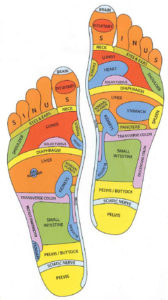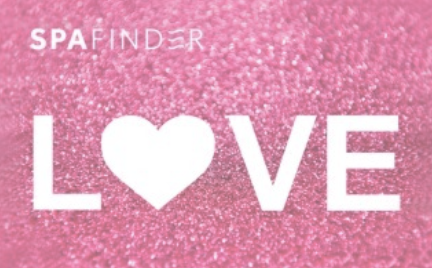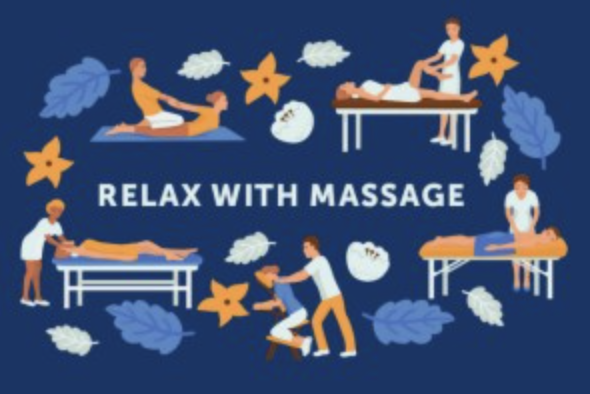What is Reflexology? It’s more than just a foot massage!
- Published: Wednesday, July 17th 2019
- in Healing
Editor’s Note: We originally published this article in January 2016. We decided to update it to include more tips and helpful information. Enjoy!
If you’re considering booking a reflexology treatment, you might have a lot of questions. What exactly is reflexology? What are the benefits? And is it just another word for a foot massage?
There’s a lot to dig into, but we’ll cover the basics of what you need to know about reflexology in this article.
What is reflexology?
In reflexology, pressure is applied to specific reflex points on the foot. These points correspond to organs and areas of the body. The treatment is said to induce a healing response, even alleviating some ailments.
Reflexology is one of the most popular types of massage. Beyond the feel-good effects of the treatment, the practice and purpose go deeper than the skin and muscles. Kneading the soft fleshy ball of the foot, pulling on the toes, tracing around the heel and pushing deep into the arch are just a few of the movements you’ll experience during a treatment.
But what is all of that for? Well, there is a method to the treatment, and it all revolves around the charted areas of your foot.
 Understanding a foot reflexology chart
Understanding a foot reflexology chart
The image on the left is an example of a reflexology foot chart or map. It shows which part of the foot connects to each organ or area of the body.
A reflexologist will use a diagram like this one during the session. Reflexologists sometimes also work on the hands or ears to trigger relaxation, but foot reflexology is the most common treatment.
As you can see, there’s a spot on the map for every organ or system in the body. A reflexologist can treat specific parts of your body by targeting that area of the foot.
How reflexology differs from a foot massage
These two treatments might seem similar, but there are some key differences. Both can be beneficial! Here’s what you can expect during a foot massage versus a reflexology massage.
Massage therapy is the manipulation of tissues to relax the muscles, relieve tension, and improve circulation. This can improve overall health and well-being.
Reflexology, on the other hand, uses a targeted, pressure-point massage to restore the flow of energy throughout the body. The treatment usually focuses on the feet, but it can also include the hands and ears.
There can be many potential benefits of this kind of treatment, which leads to the next question you might be asking.
What are the benefits?
Reflexology can address anything from headaches to sinus problems to stomach issues. If sensitivity or tenderness is experienced when an area is stimulated, it usually indicates bodily weaknesses or imbalances within the corresponding organ.
With repeated pressure and manipulation of nerve endings, reflexology can help to clear any channels of blocked energy. It is said to do so through moving the flow of blood, nutrients and nerve impulses. This ultimately improves overall health and balance.
Other potential benefits:
- Cleanse the body of toxins
- Boost the immune system
- Increase circulation
- Promote healing
- Balance energy
What to Expect At the spa
Ok, so you’re ready to book a reflexology massage. There’s a lot to know about booking a treatment and what one is like. We’ll take a detailed look at everything you need to know about the process so there are no surprises.
Things to know before you go
To be effective, a reflexology practitioner must be certified and understand the meridians related to each pressure point.
Most spas offer reflexology. At Spafinder, we make it super easy to find popular spas with the services you want. Use our search tool to find a spa near you, read reviews, and book a session online.
But you might have some questions about the treatment. Let’s answer those.
How much does a reflexology massage cost?
Similar to any spa treatment or massage therapy, prices for reflexology will vary from spa to spa. However, the pricing is usually similar to a traditional massage. You can expect to pay anywhere from $40-90 for a 1-hour session, or $30-50 for a 30-minute session.
What is a reflexology session like?
The treatment typically lasts approximately 30 minutes, but it can last up to an hour. Have a conversation with your reflexologist beforehand to discuss issues like constipation, tension headaches or trouble sleeping.
During the session, you’re clothed and seated or lying down. The therapist will rub, press on and squeeze points on your feet. The therapist may concentrate on specific areas to alleviate ailments. For example, if you have sinus trouble, she’ll focus on your toes. But the therapist might also work on the whole foot in order to strengthen every system in the body.
Important Things to Remember:
- Wait at least one hour after the massage before eating
- Don’t receive reflexology if you are pregnant. Try a prenatal massage instead.
- Drink water following the treatment to eliminate toxins and lactic acid buildup that occurs during the massage
- Consult a doctor first if you have foot problems, an injury or a blood vessel disease associated with clots or varicose veins
For more information on massage treatments, click here to see which massage is right for you. You can also search for spas that offer reflexology in your area on Spafinder.
Sources:
https://www.takingcharge.csh.umn.edu/reflexology
https://nccih.nih.gov/health/reflexology
https://www.ncbi.nlm.nih.gov/pmc/articles/PMC4624523/
https://www.mayoclinic.org/healthy-lifestyle/consumer-health/expert-answers/what-is-reflexology/faq-20058139








